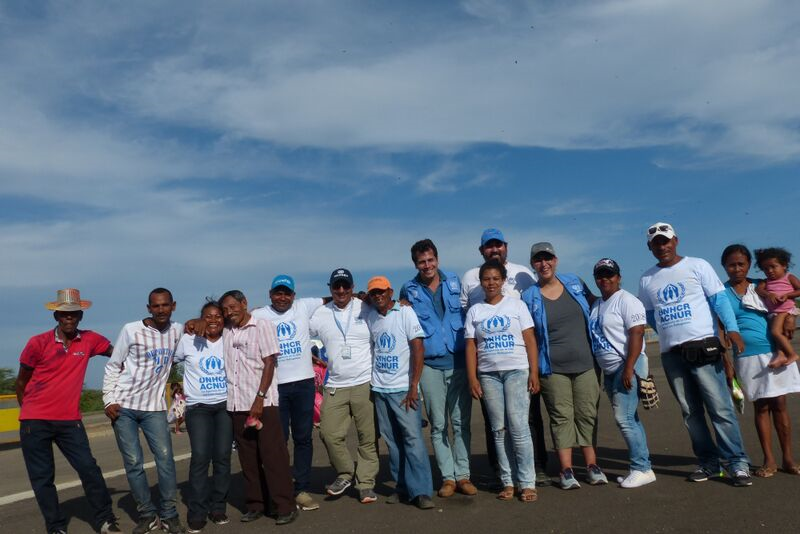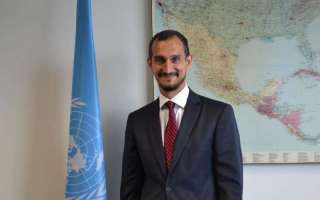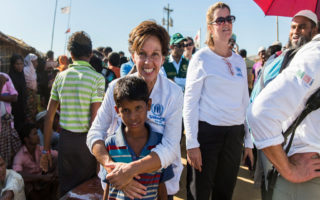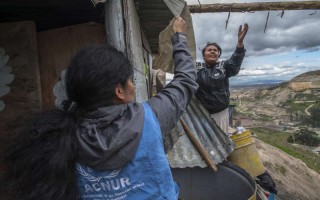
UNHCR Canada protection officer Nadia Williamson (fifth from right in baseball cap and blue vest) is seen in Riohacha, Colombia, during World Refugee Day celebrations in June 2018. © UNHCR/Ricardo Roa-Beltran
Two UNHCR protection officers give frontline accounts of desperate Venezuelans
As told to Fiona Irvine-Goulet
Give us a brief description of what your role is in helping Venezuelan asylum seekers who have fled their country.
Azadeh: Our offices are working in partnership with the Brazilian government to respond to the needs of Venezuelans, about 800 of whom arrive daily into Brazil. Managing a site in Boa Vista that houses people who are vulnerable, have specific needs and have recently left a very difficult situation is challenging and encompasses a variety of tasks, from ensuring adequate sanitation conditions on the sites to supporting survivors of sexual and gender-based violence.
Nadia: I was deployed in Riohacha, Colombia, to help with the arrival of thousands of Venezuelans. I arrived at a critical time, helping to set up registration systems, and working closely with government and non-government partners to provide for the most urgent needs.
One Spanish phrase I heard over and over again was, “En Venezuela no tengo nada.” (In Venezuela, I have nothing.)
What are Venezuelans telling you about why they are leaving their country?
Azadeh: Many Venezuelans I met left for the simple reason that they had no medicine or food needed to survive. For example, I met a woman with stage 4 cancer and she could not access medication for her pain or palliative care.
What is amazing to me is that all these people with medical problems and/or young children would walk for weeks to make it to Brazil, which speaks to their desperation and the dire humanitarian situation in Venezuela.
Many people told me that they left because there was simply no food left in the country, they were starving and searching for a better life for their children. One Spanish phrase I heard over and over again was, “En Venezuela no tengo nada.” (In Venezuela, I have nothing.)
Nadia: I heard many stories of desperation. I interviewed a mother of two young children who had recently arrived in Riohacha. I asked why she had left her home and family behind and why she preferred to live on the streets. Her response was simple but powerful: “So that my children can eat.”

UNHCR Canada protection officer Azadeh Tamjeedi is seen with refugee children in Boa Vista, Brazil. © UNHCR/Azadeh Tamjeedi
Azadeh, give us a picture of the situation for Venezuelans seeking safety and security in Boa Vista.
Azadeh: Venezuelans in Boa Vista are living in temporary sites with shelter or refugee housing units and receive food every day provided by the Brazilian army. The situation is not ideal. The weather is very hot, humid and rainy.
There are lots of children and many are not registered to go to school. Venezuelans who do not live in the sites live on the streets, often with young children.
Despite these challenges, everyone I interviewed stated they were better off in Riohacha than in Venezuela.
Nadia, you recently returned from Riohacha, Colombia, the country most affected by the exodus from Venezuela, with over 3,000 people arriving daily. What are conditions like there for Venezuelan asylum seekers?
Nadia: Basic services like water and electricity are lacking and there is a high unemployment rate in Riohacha. The region’s ability to cope with this influx of people is limited despite their strong desire to help.
It was shocking to see the dire conditions in which Venezuelans arrived, with a range of illnesses, with few clothes and malnourished. Trying to meet all these urgent needs with limited resources remains a big challenge. Many Venezuelans in Riohacha sleep on the streets as the money they make on a daily basis goes to feeding their families. Many Venezuelan women have had to resort to prostitution and children are being recruited by criminal groups. Despite these challenges, everyone I interviewed stated they were better off in Riohacha than in Venezuela.
What is the single most important thing for Canadians to understand about the growing humanitarian crisis in Venezuela?
Azadeh: That they are fleeing to save their lives because their home country is crumbling.
Nadia: I think most Canadians are unaware of the magnitude of this socio-economic and political situation that has affected over 1.6 million Venezuelans who since 2015, have left their country. It has been the biggest outflow in the modern history of Latin America.
What motivates/inspires you to work in this field?
Azadeh: My own family had to leave their country because of the political situation. The stories they told me as a young child about how and why they left motivated me to help people in similar situations. I guess you could say my family was my initial inspiration, and now the resilience of the refugees and asylum seekers that I meet inspires me to continue this work.
Nadia: The perseverance and determination of the most vulnerable people inspire me. Just putting a smile on a child’s face who has travelled five hours to get to safety and find food, clean water and shelter motivates me to keep working hard to continue helping those most in need. As a mother, I am also highly motivated by my children.





